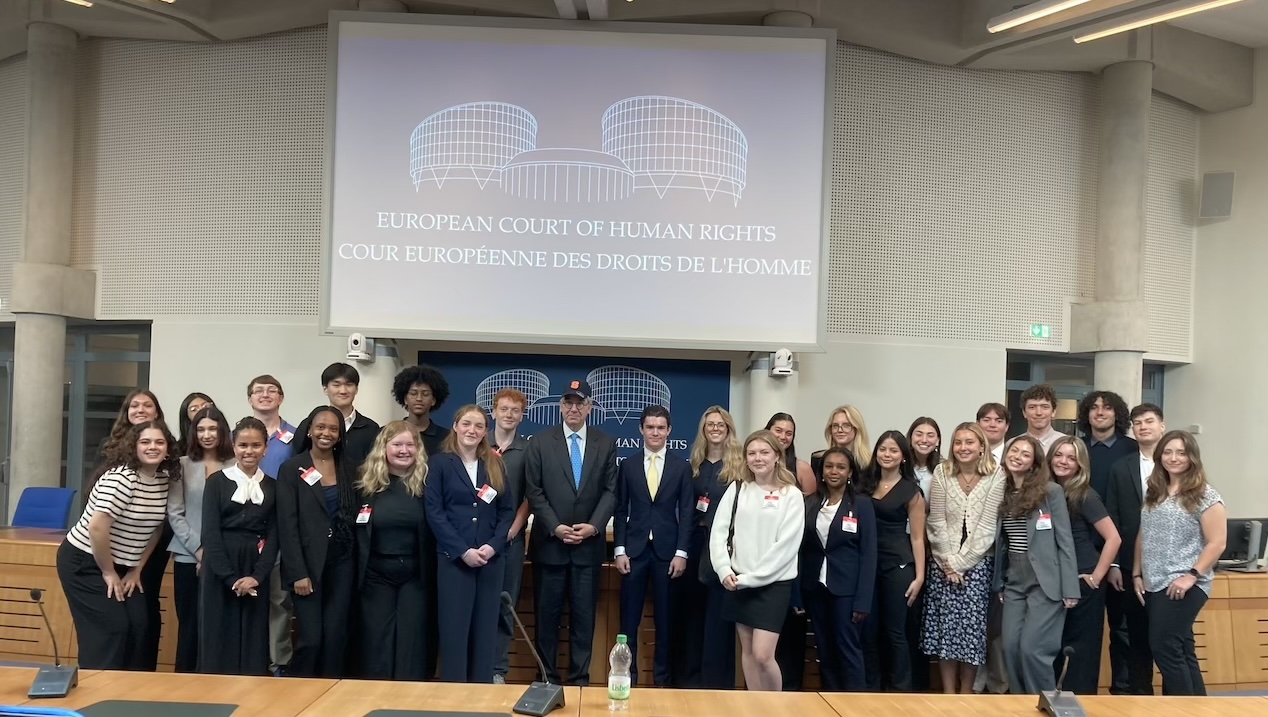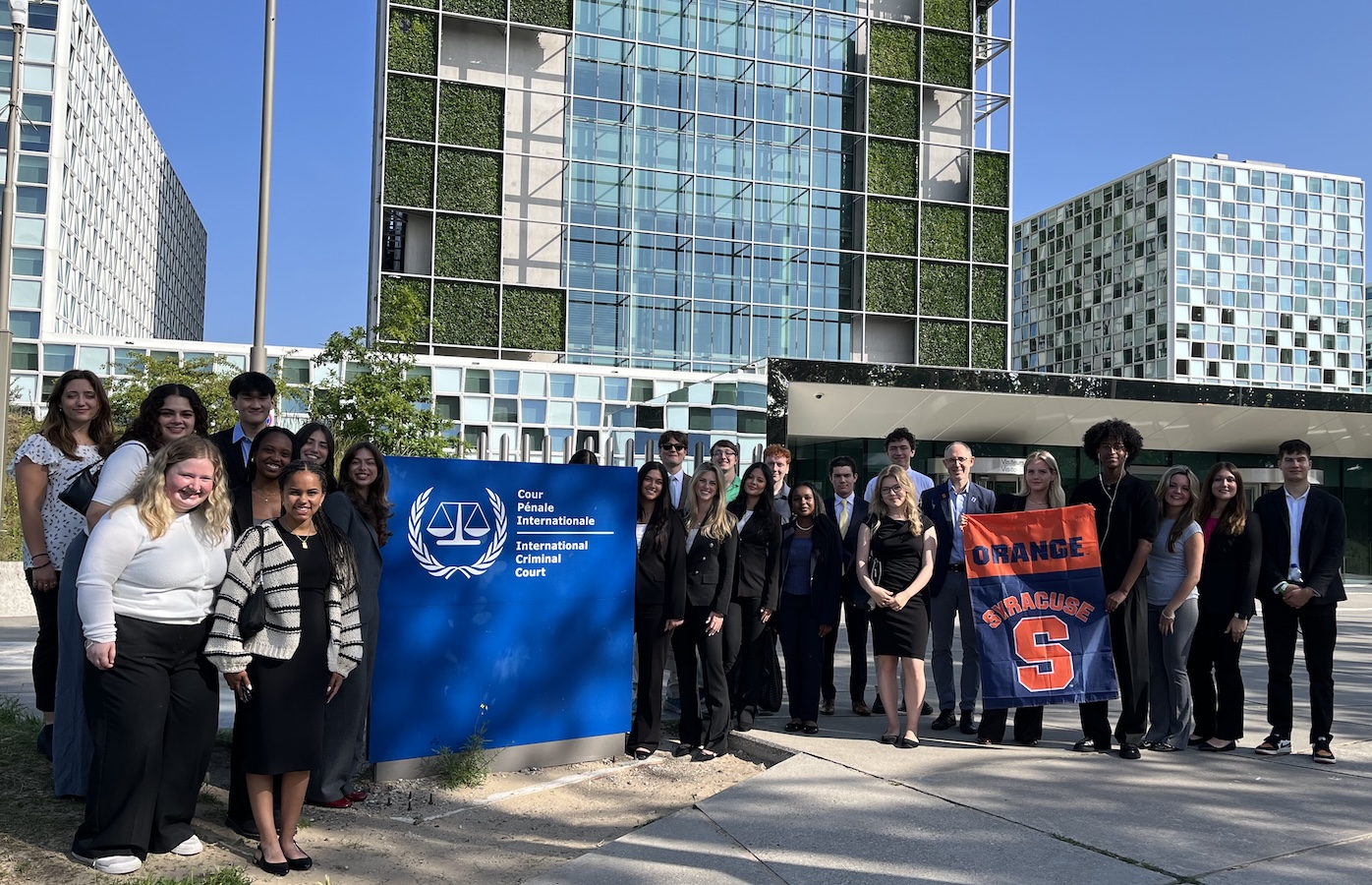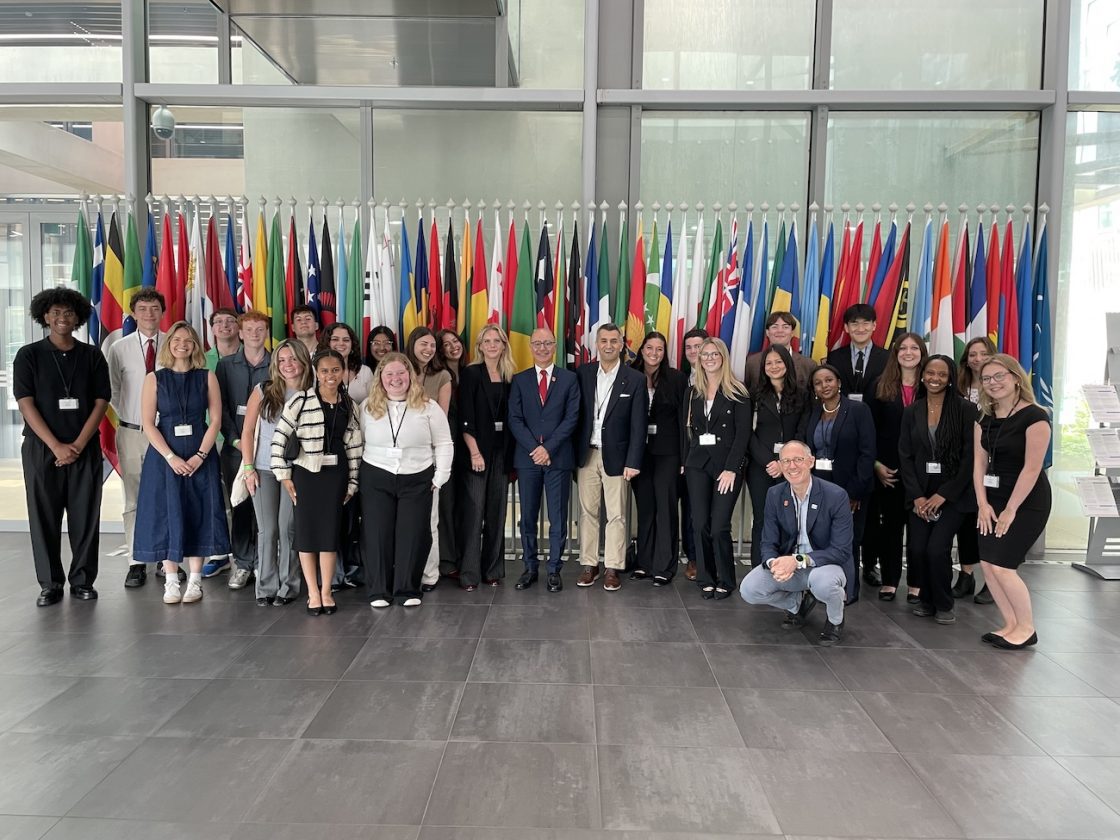Students Say the Pre-Law Program in Europe Is Transformational. Here’s Why.
When Skylar Kreske’s family came to visit her in Strasbourg, France, over the summer, they were struck by how sure she was of herself in her new surroundings.
Kreske ’27, a double major in public relations in the S.I. Newhouse School of Public Communications and international relations in the Maxwell School of Citizenship and Public Affairs, was one of 30 students who traveled to France and the Netherlands as part of the Pre-Law in Europe Program.
It was her first time out of the country, and she says she became empowered living with a host family that only spoke French, learning to navigate Strasbourg on her own and getting an introduction to the study of law alongside visits to international legal institutions.
“It’s a once in a lifetime opportunity,” she says of the program. “It will round you out as a person.”
An Immersive, Educational Experience

The Pre-Law Program in Europe began in its current iteration last year, but Yüksel Sezgin, an associate professor of political science in the Maxwell School, and an associate professor of law by courtesy appointment in the College of Law, has been bringing students to Strasbourg since 2014. For years, Sezgin offered students the opportunity to attend a five-week course on human rights and First Amendment issues through the University’s study abroad center in Strasbourg.
Syracuse’s program in Strasbourg, a historic city of 400,000 and a UNESCO World Heritage site on the border of France and Germany, has been in place for more than 50 years.
Over time, Sezgin realized there was a need for a customized program to help students prepare for law school.
His course was rebranded and expanded, and now during the five-week program in May and June, students take two courses. The first course with Sezgin focuses on First Amendment issues in different jurisdictions.
Students take their second course, which aims to equip students with the legal knowledge and academic preparation needed to succeed in law school, with professors Keith Bybee, the Paul E. and Hon. Joanne F. Alper ’72 Judiciary Studies Professor and political science professor in the Maxwell School, and John Goodman, director of the Syracuse Strasbourg Center, who has worked as a lawyer both in the U.S. and internationally. Students learn how to build a competitive application, get a preview of the skills they need to succeed in law school and are offered a look at the realities of practicing different areas of U.S. and international law.
“Once you know what kind of law you’re interested in, it will make the whole law school application process easier,” Sezgin says. “That’s what we are aiming for here.”
Students visit the European Court of Human Rights in Strasbourg and the International Criminal Court and the International Court of Justice at The Hague, where they can learn firsthand about the work of the institutions. They also have the opportunity to intern with the Council of Europe and in other law- and international affairs-related fields.
Sezgin says the program is intentionally crafted to give participants time to network and explore while in Europe.
“These are really eye-opening, transformational experiences,” he says, with students being able to access these important legal institutions.
Inspiration Inside, and Outside, the Classroom

Sezgin’s favorite moment from the program this year was when students met with Judge Haykel Ben Mahfoudh at the International Criminal Court. Mahfoudh, who was a 2009 Maxwell Civic Education and Leadership Fellow, talked with the undergrads about his time in Syracuse.
At the end of the meeting, Sezgin pinned his own Syracuse “S” pin to the judge’s jacket.
“That was meaningful for our students, because they understood how extensive our network is at Syracuse,” Sezgin says. “Also, we keep telling students, ‘Hey, you will go to court’—but then when they go to court, when they enter those buildings, for instance, with the ICJ, the Palace of Peace in The Hague, when you enter that majestic building, it’s just a different feeling.”
Chloe Brown Monchamp ’28, who is majoring in political science, says the program helped her reframe the way she thought about law school.
“It helped me find exactly what I wanted to do,” she says. “I knew the end goal that I wanted, which was to help people, but I never knew exactly how I could do that in a way that was the most productive and in a way that had the most impact.”
The passion and experience brought into the classroom by Sezgin, Bybee and Goodman, along with the guest professors and speakers, is galvanizing, says Augustus Stimpson ’25, who majored in policy studies.
“Having these people present, alone, inspires you to want to go out, and not just enter their career, but to make a difference,” Stimpson says.
Hannah McLoughlin ’25, a history and political science major graduating in December, said with the small class sizes, the courses felt more like guided discussions between her and her classmates.
“It was one of the most immersive educational experiences I’ve had to date,” she says. “I really enjoyed how we met so many different people in the profession. It wasn’t just theoretically talking about the profession; we were actually talking to lawyers and judges who work at the human rights courts.”
McLoughlin said the program solidified her goal of attending law school and she brought the inspiration she felt in Strasbourg back to Syracuse.
“Now I know the potential of what a class can hold,” she says.



